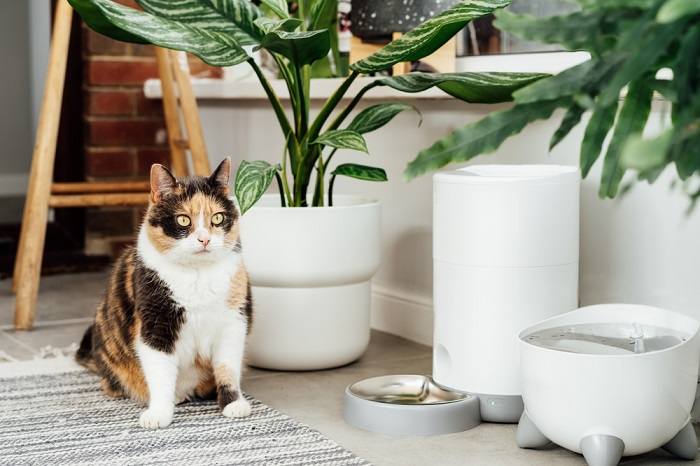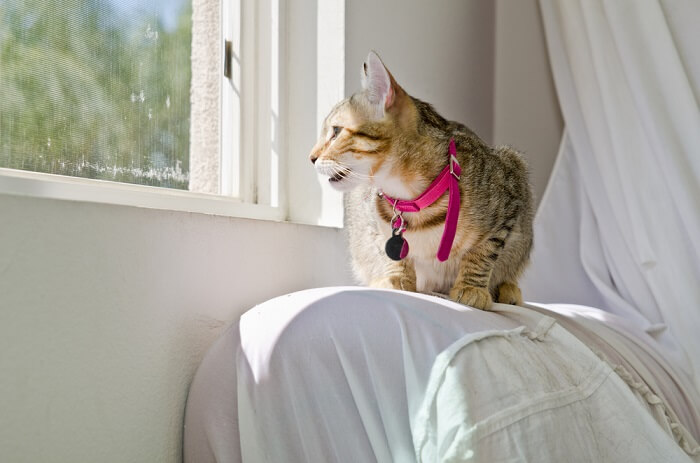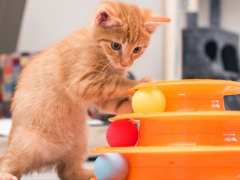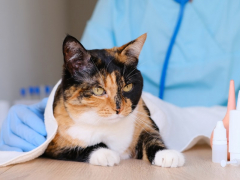
When choosing a pet, many people are attracted to cats as they are perceived to be independent creatures that are low maintenance compared to dogs. But how long can you leave your cat home alone without risking their health or emotional well-being?
Despite the commonly held belief that cats are totally independent, some cats suffer from separation anxiety when left alone. In general, it is reasonable to leave your cat alone for a maximum of 12 to 24 hours, though kittens and cats with medical conditions should be checked on more frequently. If you need to be away from home for longer than 24 hours, arrange for a friend, neighbor, family member, or pet sitter to look after your cat, or bring your cat to a boarding facility.Key Takeaways
The length of time varies between individuals, but generally, most cats can be left alone for 12 hours, and with careful planning, this can be extended to 24 hours. In this article we will discuss why you should limit the time your cat is left alone, and what options there are to keep your cat safe and well when you need to be away from home for longer periods.
Do Cats Mind Being Alone?
Unlike dogs, who usually love going out with their owners, cats are territorial animals and most prefer to stay close to home. Cats often find traveling stressful and have a tendency to escape through open windows and doors, so on the whole they don’t accompany us on days out or trips away. But do cats mind being alone?
There is a common stereotype that cats are aloof, and don’t rely on their owners for anything more than a comfy bed and a ready supply of food. In which case, as long as their basic needs are met, does it matter if they are alone for long periods?
A study has proved what many cat owners already knew—cats form strong attachments to their owners, and rely on us for security and affection. It has also been shown that when cats are alone for longer periods they purr more on their owner’s return and initiate more social contact, indicating they do miss us after all.
Some cats even suffer from separation anxiety syndrome, and display behaviors associated with distress when their owners are out of the house such as:
- House soiling (toileting in undesirable places)
- Destructiveness
- Overgrooming
- Excessive vocalization
You should contact your veterinarian for help if you think your cat is affected.
But Don’t Cats Just Sleep All Day?
Cats do sleep a lot. Many cats sleep up to 18 hours or more each day. However, cats have a polyphasic sleep pattern, which means that they sleep multiple times each day rather than for one long period.
Their average sleep cycle is 104 minutes, consisting of 79 minutes of sleeping, and 26 minutes of awake time. They are also more active during the twilight hours of dawn and dusk. So although cats sleep a lot, they are unlikely to sleep for the whole day while you aren’t there, and may get lonely or bored if they repeatedly wake up alone.
Why Can’t I Leave My Cat Alone for Longer?

Although it is possible to leave enough cat food, water, and clean litter boxes for longer periods than 24 hours, it is not advisable in case of a medical emergency.
It may be that you feel that your cat would be perfectly content without any human company for several days. Cats have individual personalities, and some crave human contact more than others.
Although it is possible to leave enough cat food, water, and clean litter boxes for longer periods than 24 hours, it is not advisable in case of a medical emergency. Life-threatening conditions such as blood clots (thromboembolism) or urinary blockages can come on very quickly, are extremely painful and distressing, and can rapidly lead to death without veterinary treatment.
Cats with access to the outdoors are at higher risk of trauma from things such as road traffic accidents, but cats alone in the house can still hurt themselves by falling off furniture or taking a tumble down the stairs. If nobody is regularly checking them, they will not get urgent veterinary treatment in time.
Are All Cats Fine To Be Left Alone for a Day?
There are some situations where even 12 hours is too long to leave your cat alone. Kittens need much more frequent attention and supervision than adult cats and should not be left alone for more than four hours. This time can gradually be lengthened as they approach 6 months old.
Cats that are unwell, or have long-term health conditions requiring regular medication, need to be checked on more frequently.
Tips for Leaving Your Cat Alone
Let’s face it, as much as we’d all love to stay at home with our cat all day, for most of us it isn‘t possible. Many cats will regularly be left alone for the length of a typical workday.
The following is a list of suggestions to meet your cat’s physical and emotional needs when they are alone for periods of the day, or overnight:
- Safety proof your house. Leave toilet seats down, prop open doors so cats can’t get trapped in rooms, close windows, and keep chemicals and potential toxins shut away.
- If your cat has access to the outdoors, it’s probably safer to keep them in when you are not around. Outdoor cats are at risk of road traffic accidents, fights with other animals, trauma from falls, and toxins.
- Ensure there is plenty of fresh food and clean water. Either fill several water bowls in case one gets knocked over, or consider a water fountain. Automatic cat feeders can be useful, as can microchip feeders (especially if you have multiple cats or cats on different diets).
- Ensure that litter boxes are clean and make sure that you have one available for each cat in the house plus one extra.
- Pet-cameras can be useful to give you peace of mind and see what your cat is up to. Some even double up as treat dispensers!
- Pheromone diffusers can help reassure your cat and prevent stress when they are alone.
- Consider leaving the television or some music on. Research into cats’ preferences has led to music written specifically for feline ears!
- Environmental enrichment helps prevent boredom and loneliness. Try scratching posts, cat trees, puzzle feeders, and toys.
What Options Do I Have for Longer Trips Away From Home?

For absences longer than 24 hours, arrange for someone to look after your cat, preferably in your own home.
If you need to be away from home for longer than 24 hours, it is vital to arrange for someone to look after your cat. Cats are territorial, so it is generally less stressful for them to be cared for in their own home if possible, either by a neighbor or friend visiting several times a day, or a professional pet sitter.
The alternative is using a boarding cattery. Which option you chose will depend on many factors, including your cat‘s personality. A poor traveler who spends car journeys vomiting, meowing, and yowling, is probably best cared for at home.
A sociable, young, active cat likely to get bored and into mischief if unattended for long periods, might be better booked into a secure boarding cattery for more constant supervision and attention.
Neighbor, Friend, or Family Member
- Ideally, pick someone “cat savvy” so they are more likely to notice signs of ill health or injury.
- Your cat may feel less stressed as they have someone familiar visiting, rather than a stranger.
- This is usually the least expensive option, but a nice gift would probably go down well!
Professional Cat Sitter
- Some stay in your house while you are away, keeping your cat company, and taking care of your home.
- Other pet sitters visit for an agreed length of time each day.
- Usually found via agencies (so their credentials and insurance details are checked) or via personnel recommendations.
- Along with boarding cattery staff, they may be more experienced in giving medications and noticing signs of ill health.
Licensed Boarding Cattery
- May be suitable for laid-back, adaptable cats, however, some cat find the close proximity of other cats very stressful.
- Arrange a visit to meet and talk to the staff before booking to check if the facilities are suitable for your cat.
- Check their security protocols. There should be less chance of cats escaping from a cattery compared to being cared for at home (where it is easier for them to nip out of a door or window accidentally).
- International Cat Care has produced an excellent article on how to choose a boarding cattery, which you may find helpful.
Regardless of which option you chose, always leave emergency contact numbers for yourself and your veterinarian. If your cat is on medication, ensure there’s enough to last until you are home and that the person looking after your cat knows how and when to give it.
If your cat is being looked after at home ensure you have explained their usual routine, and pointed out where to find all of their essentials. Ask the carer if they could spend some time with your cat at each visit fussing and playing with them so that they don’t get lonely or bored (as well as doing the essentials of topping up food, and water and cleaning their litter boxes).
In Review

Assess your individual cat to help determine exactly how long they will be happy left alone in the house.
Although the precise length of time you can leave your cat alone varies with each individual’s age, health, and personality, in general, it is reasonable to leave your cat alone for a maximum of 12 to 24 hours.
Despite the commonly held belief that cats are totally independent, they do rely on us for companionship, and some cats suffer from separation anxiety when left alone. Although the provisions for cats’ basic needs of food, water, and toileting can be provided for longer than 24 hours, cats should not be left alone for extended periods in case of a medical emergency or traumatic accident.
Some cats travel happily with their owners, but most cats find this too stressful, and it is often not practical to take them with you. Being territorial, most cats will be less stressed if they can be cared for at home when you go away, either by a friend or neighbor, or a professional pet sitter. For some laid-back cats, or those needing more frequent supervision or medication, a boarding cattery might be a more suitable option.
Also Read: 5 Ways To Build A Stronger Bond With Your Cat
Frequently Asked Questions
Can I leave my cat alone for three days?
No, it is not advisable to leave your cat alone for any longer than 12 to 24 hours at a time. Even if you can provide enough food and water for this length of time, cats are sociable creatures and need company. Some medical conditions in cats, such as urinary blockages, can be rapidly fatal, so someone needs to be checking on them at least once a day.
Can I leave my cat alone overnight?
It is usually OK to leave your cat alone overnight occasionally if there is no other option. Ensure that you provide plenty of food and water, as well as clean litter boxes. Remember though that cats bond to their human companions, and may get lonely and stressed when they are alone.
Who can look after my cat when I need to go away?
Most cats are territorial and will be less stressed if you can arrange for them to be looked after in their own home by a friend or neighbor, or a professional pet sitter. The alternative option is to use a boarding cattery. This may be a good option for laid-back, sociable cats, or those with medical needs that need the experience of cattery staff for supervision and administering medications.
-
Eriksson, M., Keeling, L. J., & Rehn, T. (2017). Cats and owners interact more with each other after a longer duration of separation. PLoS ONE, 12(10). https://doi.org/10.1371/journal.pone.0185599
-
Lucas, E., & Sterman, M. (1974). The polycyclic sleep-wake cycle in the cat: Effects produced by sensorimotor rhythm conditioning. Experimental Neurology, 42(2), 347-368. https://doi.org/10.1016/0014-4886(74)90032-6
-
Sordo Sordo, L., Breheny, C., et al (2020). Prevalence of Disease and Age-Related Behavioural Changes in Cats: Past and Present. Veterinary Sciences, 7(3). https://doi.org/10.3390/vetsci7030085
-
Souza Machado, D. D., Barbosa Oliveira, P. M., Machado, J. C., & Ceballos, M. C. (2020). Identification of separation-related problems in domestic cats: A questionnaire survey. PLOS ONE, 15(4), e0230999. https://doi.org/10.1371/journal.pone.0230999
-
Vitale, K.R., Behnke, A.C., Udell, M.A.R. (2019). Attachment bonds between domestic cats and humans. Current Biology, 29(18), PR864-R865. https:doi.org/10.1015/j.cub.2019.08.036
-
- www.cats.org.uk
- www.icatcare.org
- www.musicforcats.com/
- www.pedmd.com
- www.petplan.co.uk
- www.sleepfoundation.org








I would suggest adding a note that if you do use a kitty fountain, you should always have a bowl of water available as well. There was a time where I was away from home for the night and the power went out – the fountain we have makes the water inaccessable if the pump isn’t running! Fortunately we also had the water bowl to keep kitty hydrated.
Great point; thank you for sharing that idea!
We are taking our 3 yr old cat with us on a short road trip over thanksgiving with our 2 dogs. It will be the first time he travels a distance in the car and I am nervous he will not adapt well. He’s a friendly kitty in general when we have visitors at home. We are visiting family and friends. Is it a bad idea to travel for 2-3 hrs in the car with our kitty and stay in a hotel with him plus visit family with him?
I don’t think it’s a terrible idea, but it’s probably going to be a bit stressful. If you’re only staying away for one night, I see no reason why you can’t leave him at home. If it’s more than one night, a sitter would be ideal. If you do continue with this plan of taking your cat with you for Thanksgiving, I’d recommend being very clear with all guests that the door can’t be left hanging open and that you keep a close eye on him. And especially when you’re busy mingling with family and friends, I would let him stay in a designated “safe space” that he can kind of claim as his own. Your cat doesn’t need a huge amount of space, especially in an unfamiliar environment, so staying in a single bedroom with a litter box, food, and water would be just fine. Unless he’s totally comfortable in this strange environment, there’s no need to over-stress him by letting him wander around an entire unfamiliar home. This is a really cool idea, and I would love to see him thrive, but you are going to face some challenges, and it’s important that you account for that while you’re planning. Happy Thanksgiving!
We traveled for. years with are 2 cats than later. 3. You must have carriers for each or cat or xx large for 2.cats if there friends. Travel in van with no middle seats .pack in semi circle with lots of room to sleep and some like to look out windows. At first there upset so leave them in carrier till they clam down and open the door and let them decide when they come out. Put them in carrier s before you open your door.s. they wil run run run😥😥😥